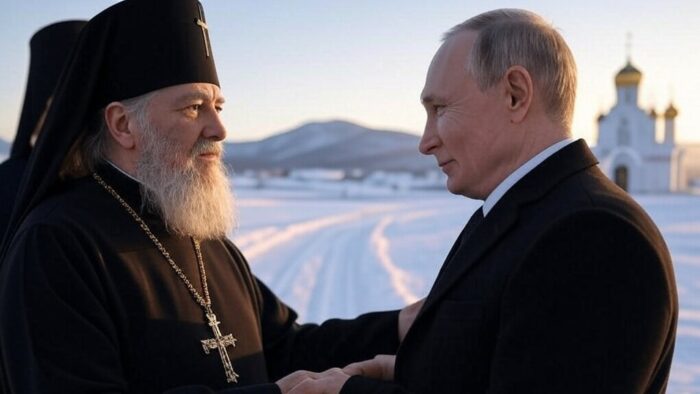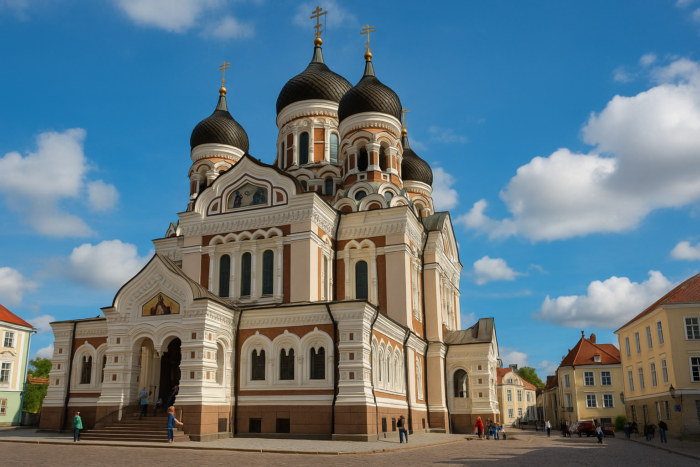The Russian Orthodox Church (ROC), under the leadership of the Moscow Patriarchate, has evolved into a central instrument of Russian state influence, operating well beyond its religious mandate to advance Kremlin interests abroad. Across Europe and the United States, the ROC is recognized for its role in disseminating pro-Kremlin narratives, conducting espionage, and recruiting intelligence assets. No longer limited to pastoral duties or cultural preservation, the Church now operates as a transnational ideological actor whose activities align closely with Russian foreign policy goals.
Global Influence Operations and Strategic Narratives
The Global Influence Operations Report (GIOR) has described how the Russian Orthodox Church has become a pivotal tool for Kremlin influence, utilizing its spiritual authority and transnational networks to advance Russian soft power and ideological narratives worldwide. Its influence operations are multifaceted, promoting Russian state propaganda, defending Russian military actions, and championing “traditional values” while opposing Western liberalism. The ROC frames Russia as a defender of a moral and religious order, a narrative that resonates deeply among conservative movements abroad. As reported by GIOR, in regions such as the Balkans, Russia exploits shared religious traditions to forge deeper political and cultural connections, often using Orthodox Christianity as a conduit for strategic influence over sectors like energy, real estate, and local elites.
Building Conservative and Diaspora Networks
By cultivating conservative networks among both the Russian diaspora and local populations, the ROC fosters a sense of shared cultural and religious identity with Russia. This identity-building is not merely symbolic; it provides the Kremlin with a receptive audience for its broader ideological agenda. The Church’s influence extends into media and digital platforms, where affiliated outlets amplify state narratives and disinformation, embedding Russian perspectives in foreign societies. These efforts often include partnerships with sympathetic actors in Western countries who promote narratives of cultural decline in the West and a spiritual revival centered in Moscow. In the US, the GIOR has reported that the Russian Orthodox Church Outside Russia (ROCOR) is experiencing rapid expansion, primarily driven by young male converts who are rejecting modern American culture and embracing what they perceive as authentic masculine spirituality.
Political Coordination and Undermining Western Integration
Politically, the ROC collaborates closely with Russian embassies and state agencies to foster political and cultural ties, particularly in countries with substantial Orthodox populations. This coordination facilitates the penetration of Russian state interests into national and regional institutions. In nations such as Ukraine and Bulgaria, the Church has sought to undermine national identity and integration with the West by supporting pro-Russian factions and opposing pro-Western movements. GIOR highlights that within Europe, Estonia’s recent legislative push to sever church ties with Moscow underscores mounting concerns about the Orthodox Church’s role in furthering Kremlin objectives. This legislative action reflects not only domestic resistance to Russian influence but also a growing recognition of the ROC’s role in hybrid operations, particularly in light of its overt support for Russian military actions in Ukraine.
Espionage, Recruitment, and Intelligence Activity
In several European countries, the ROC has been accused of leveraging its influence within refugee communities to suppress pro-Ukrainian voices and promote loyalty to Moscow. These activities are not isolated incidents but part of a broader pattern of covert operations involving religious infrastructure. Espionage and intelligence activities conducted through church structures are well-documented. Russian intelligence services have repeatedly recruited agents from among ROC clergy and parishioners, utilizing church networks as cover for espionage operations. There have been instances where clergy were found in possession of dossiers on prominent individuals—information that could be used for blackmail or recruitment purposes. The strategic placement of ROC churches near sensitive infrastructure—such as nuclear plants and airports in Sweden and other countries—has also raised suspicions of intelligence-gathering activities. Internal documents reveal direct cooperation between the ROC and Russian security agencies, with clergy involvement in “operational activities” sanctioned by church leadership. These revelations expose the dual-use nature of religious organizations under Kremlin control.
International Case Studies of ROC Operations
Notable cases illustrate the scope and sophistication of these activities, confirming that the ROC’s role in intelligence and influence operations is not merely theoretical but operationally significant:
- United States: The FBI has investigated ROC clergy for recruiting agents among Orthodox communities. In one case, a priest’s computer was found to contain detailed files on other clergy and their families, likely intended for blackmail or recruitment. These cases highlight the Church’s potential as a cover for intelligence-gathering operations on U.S. soil.
- Bulgaria: Authorities expelled Russian Archimandrite Vassian and two Belarusian priests for actions deemed threatening to national security. These included promoting Kremlin interests and attempting to influence local politics. The case underscores how ROC clergy are sometimes deployed as strategic actors in geopolitical hotspots.
- Sweden: ROC churches located near critical infrastructure—such as airports and energy facilities—have come under intelligence scrutiny. Swedish authorities responded by withdrawing public funding from Moscow-linked parishes due to espionage concerns. This illustrates how state actors are now actively reassessing the risks posed by Russian religious institutions.
- Czech Republic: Czech intelligence investigations led to the expulsion of a Russian Orthodox cleric accused of promoting secessionist movements with the backing of Russian state actors. This example reinforces the pattern of ROC clergy participating in efforts to destabilize national unity and undermine pro-Western orientation.
Hybrid Warfare and Patriotic Indoctrination
Beyond propaganda and espionage, the ROC is also implicated in hybrid warfare and subversion. It is used to sow division within Western societies, amplify anti-Western sentiment, and disrupt democratic processes. The Church’s messaging is designed not only to uplift Russia’s image but to undermine the legitimacy of liberal democratic norms. As reported by GIOR, the alignment between the Church and the Kremlin is further underscored by Patriarch Kirill’s endorsement of the war effort and the promotion of “traditional values”, which serves to rally conservative movements in the West and amplify Russian narratives about defending Christian civilization against perceived Western liberalism. In occupied regions of Ukraine, ROC clergy have been documented passing troop locations to Russian forces and supporting the occupation. These actions show that the Church’s role is not merely rhetorical. The ROC also engages in patriotic indoctrination, publishing materials and conducting activities designed to instill loyalty to the Russian state and military among its followers, reinforcing its function as a tool of national mobilization.
Strategic Convergence of Religion and Geopolitics
These operations demonstrate Moscow’s strategic intertwining of religious identity with geopolitical aims, fostering division and impeding Western integration efforts in targeted societies. The ROC’s position at the intersection of faith, identity, and power makes it uniquely potent as both a messenger and a mechanism of influence. Through its coordination with state actors, exploitation of diaspora networks, and appeal to culturally conservative audiences, the Russian Orthodox Church operates not only as a religious institution but as a global political actor advancing the Kremlin’s long-term strategic objectives.
External References
-
European Parliament Research Service: Russia’s war on Ukraine: The Kremlin’s use of religion as a foreign policy tool
https://www.europarl.europa.eu/RegData/etudes/ATAG/2022/729430/EPRS_ATA(2022)729430_EN.pdf -
CEPA: The Russian Church — Spreading Putin’s Poison
https://cepa.org/article/the-russian-church-spreading-putins-poison/ -
France 24: The church by the airport: Inside Russia’s suspected spy activities in Sweden
https://www.france24.com/en/europe/20250704-the-church-by-the-airport-inside-russia-s-suspected-spy-activities-in-sweden -
Radio Free Europe/Radio Liberty: Bulgaria expels Russian Archimandrite Vassian
https://www.rferl.org/a/bulgaria-expels-russian-archimandrite/32221883.html -
Jamestown Foundation: Moscow Uses Russian Orthodox Church as Covert Foreign Policy Tool in Ukraine and the West
https://jamestown.org/program/moscow-uses-russian-orthodox-church-as-covert-foreign-policy-tool-in-ukraine-and-the-west/ -
UNITED24 Media: Russian Orthodox Church: What Does It Hide?
https://united24media.com/war-in-ukraine/secret-fraternities-a-nuclear-plume-a-temple-of-war-and-espionage-globally-what-does-the-russian-orthodox-church-hide-927 -
HackYourMom: Russian Orthodox Church Espionage in Europe
https://hackyourmom.com/en/kibervijna/shpygunstvo-rpcz-u-yevropi-religiya-chy-rozvidka/ -
Molfar: Does the Russian Orthodox Church Spy in Europe?
https://molfar.com/en/blog/rpc-shpygue-u-evropi-doslidzhennya-molfar-chastyna-persha -
Aspenia Online: Understanding Russian disinformation strategies inside and outside the country
https://aspeniaonline.it/understanding-russian-disinformation-strategies-inside-and-outside-the-country/ -
Wilson Center: How Moscow Uses the Russian Orthodox Church as a Tool to Suppress Religious Freedom
https://www.wilsoncenter.org/blog-post/how-moscow-uses-russian-orthodox-church-tool-suppress-religious-freedom -
GLOBSEC: Foreign Malign Influence in Central Europe and the Western Balkans
https://www.globsec.org/sites/default/files/2022–02/Foreign-malign-influence-in-Central-Europe-and-the-Western-Balkans.pdf -
The Parliament Magazine: Estonia takes final steps to split church from Russia
https://www.theparliamentmagazine.eu/news/article/security-fears-over-russian-church-have-no-easy-answer
Disclaimer: This analysis was prepared with the assistance of artificial intelligence. Please verify all information and references before using. Images are also AI-generated and are for illustrative purposes only—they are meant to represent the events or individuals concerned, but should not be understood as “real-world” photography.










